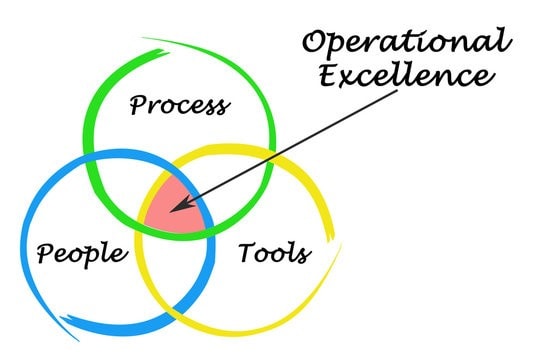

Operational excellence is a key goal for organizations aiming to drive competitive advantage, improve customer satisfaction, and ensure sustainable success. It usually involves having the right operating model in place, providing training to staff, and a focused management team.
Striving for operational excellence? Leverage benchmarks
This expert guide explores the key strategies, initiatives, and practices for operational excellence, offering insights into its implementation and long-term benefits. Here's the list of topics covered:

Operational excellence is a comprehensive business strategy designed to achieve efficiency, quality, and adaptability across all processes within an organization. By focusing on streamlining your operations, you can drive significant business value. Organizations embracing operational excellence can better manage costs, enhance productivity, and improve customer experience, all of which are essential for long-term success.
At its core, operational excellence is about having the right organizational structure, fostering a culture of continuous improvement, enabling organizations to maximize their ability to adapt to changing market demands and customer expectations. Companies that prioritize this approach not only achieve their operational excellence goals but also solidify their position as leaders in their industries (with more customers and clients).
Benchmarking best in class companies? Get started here
To achieve operational excellence, organizations must integrate these key elements:
By aligning these elements, organizations can create a robust foundation for continuous improvement and operational success.

Operational excellence consulting provides organizations with the tools and expertise needed to achieve their strategic goals. Consultants help identify inefficiencies, implement best practices, and develop tailored solutions to meet specific challenges.
The key benefits of engaging consultants include:
Consultants also provide support in designing operational excellence initiatives that drive continuous improvement and foster innovation.
Curious about benchmarking? Compare your company
Operational efficiency lies at the heart of operational excellence. To achieve it, organizations can:
These initiatives not only improve operational efficiency but also contribute to overall business success.
Continuous improvement is essential for maintaining operational excellence over time. Organizations should:
By prioritizing continuous improvement, organizations can adapt to evolving market conditions and maintain their competitive edge.

Effective operational excellence initiatives are tailored to an organization’s unique needs. The process usually involves:
Regular monitoring and evaluation of these initiatives are critical to achieving operational excellence goals.
Sustainability requires embedding excellence into the organization's culture. This can be achieved by:
By sustaining operational excellence, organizations can achieve long-term success and maintain a competitive advantage.
Explore benchmarks for operational excellence insights
Several businesses have achieved remarkable results by embracing operational excellence. For example:
These examples highlight how a focus on process excellence and continuous improvement can deliver significant business value.
To achieve excellence, organizations should:
By implementing these best practices, organizations can maximize the impact of their operational excellence initiatives.

As industries evolve, the focus on operational excellence will intensify. Emerging trends include:
These trends underscore the importance of continuous improvement and adaptability in achieving operational excellence.
Ready to achieve operational excellence? Get benchmarks
Operational excellence is not a one-time effort but an ongoing journey that requires dedication and strategic focus. By adopting proven strategies, implementing effective initiatives, and fostering a culture of continuous improvement, organizations can achieve their operational excellence goals.
Through the support of operational excellence consulting and a commitment to best practices, businesses can maximize efficiency, enhance customer experience, and secure a lasting competitive advantage.
.svg)
Download a copy of our latest all industry report with data to benchmark the Finance, HR, IT and Marketing functions.
Insights are just around the corner.
.svg)
.svg)